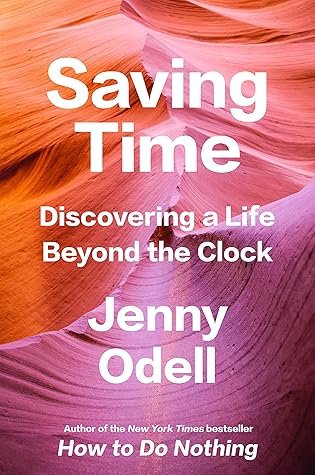More on this book
Community
Kindle Notes & Highlights
by
Jenny Odell
Read between
March 25 - April 10, 2023
the origins of the clock, calendar, and spreadsheet are inseparable from the history of extraction, whether of resources from the earth or of labor time from people.
In other words, the goal of capitalism is not free time but economic growth; any time freed up goes right back into the machine to increase profits. Thus the paradox: The factory is efficient, but it also produces “the drive toward the consumption of the person’s time up to its outermost, physical limit.” Or, as the workplace adage would have it, “The only reward for working faster is more work.”
Now, not only does increased productivity not lead to free time, but it doesn’t lead to money for American workers. Their time is more money, but for someone else.
I don’t mean to suggest that there isn’t an art to designing and acting in experiences, nor that there is some uncomplicatedly “authentic” experience hiding behind the screen of its commercial counterpart—if only I could grab it—nor that people can’t have a genuinely good time at a place like a theme park. It’s just that, as the experience economy expands to include commodified notions of things like slowness, community, authenticity, and “nature”—all while income inequality yawns wider and the signs of climate change intensify—I feel the panic of watching possible exits blocked. I keep
...more
Given the opportunity to slow down, what I find is not slowness per se, but simply what has been happening all along, just outside my perception.
What songs are audible when the wind stops? What has been kept alive in the time snatched from work and sheltered from ongoing destruction—what moments of recognition, what ways of relating, what other imagined worlds, what other selves? What other kinds of time?
The difference between work and leisure often meant two different tabs in my browser.
Arizona does not observe Daylight Saving Time because, as two Arizonans put it in 2021, “when you live in the desert, daylight is way overrated….So no, we don’t want to save it.”
But just as ladder-climbing ambition is only one form of desire—one that exists on and reinforces a specific plane—there are many forms of frustration beyond what is trivially referred to as burnout. Some of those frustrations, whether you are advantaged or disadvantaged, include the following: having to sell your time to live, having to choose the lesser of two
evils, having to say something while believing in another, having to build yourself up while starved of substantive connection, having to work while the sky is red outside, and having to ignore everything and everyone whom, in your heart of hearts, it is killing you to ignore. There is wanting more for yourself, and then there is simply wanting more.
No matter how optimized, healthy, and productive I am, I simply will not become more or better forever, which means there are things I will never do and never be. Just like this book, which could have been anything when I started it, my life will take some paths and not others—and then it will end, the thread pulled out of the ball, with no witch to indulge me by taking it back. Realizing that I cannot be everything is in one sense incredibly freeing: It means I am not responsible for being everything. Yet the fact that life ends, for anyone who enjoys being alive and in the world, is also
...more
Lucid dreams are truly a liminal state between sleeping and waking; I know in the dream what day it is, what I’m wearing, and what I’ve done in other lucid dreams. I am also aware that the dream will probably end in a few minutes, so the question becomes what to do in that time. But this is a very different kind of “point” from the one I would have been propelled by just moments ago, given that, for the most part, I would sum up my purpose in a lucid dream as “just looking around.” I know that I will wake up soon, and I want to prolong the dream. But I’m not afraid of waking up. I have only
...more


